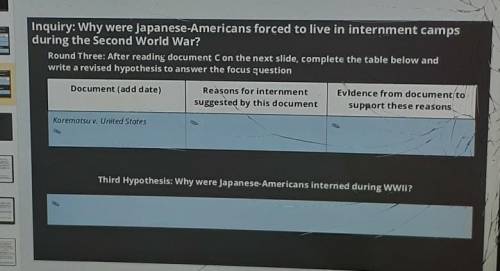
History, 26.04.2021 21:00 alyssagibson470
Document C: The Korematsu Supreme Court Ruling We uphold the exclusion order as of the time it was made and when the petitioner (Mr. Korematsu) violated it.In doing so, we are (aware of the hardships imposed by the exclusion order] upon a large group of American citizens.But hardships are part of war... All citizens alike, both in and out of uniform, feel the impact of war in greater or lesser measure. Citizenship has its responsibilities, as well as its privileges, and, in time of war, the burden is always heavier. Compulsory (required) exclusion of large groups of citizens from their homes... is inconsistent with our basic governmental institutions. But when... our shores are threatened by hostile forces, the power to protect must be commensurate (equal) with the threatened danger... To (talk about this case (as) racial prejudice, without reference to the real military dangers which were presented, (only) confuses the issue. Korematsu was not excluded from the Military Area because of hostility to him or his race. He was excluded because we are at war with the Japanese Empire, because the military authorities feared an invasion of our West Coast and ... decided that the military urgency of the situation demanded that all citizens of Japanese ancestry be segregated from the West Coast temporarily, and finally, because Congress, (placing] its confidence in this time of war in our military leaders... determined that they should have the power to do just this.


Answers: 1


Another question on History

History, 21.06.2019 15:00
Which statement regarding the distribution of wealth by the mid-19th century is most accurate?
Answers: 3

History, 21.06.2019 19:00
Which of the following was a characteristic of government proposed by the new jersey plan? it denied congress the ability to levy taxes. it based representation on population rather than keeping states equal regardless of size. it denied congress the ability to regulate trade. it preserved an executive committee rather than adopting a singular president.
Answers: 1


History, 22.06.2019 01:00
Which of the following phrases best describes american society in the early 1900s
Answers: 2
You know the right answer?
Document C: The Korematsu Supreme Court Ruling We uphold the exclusion order as of the time it was m...
Questions

Mathematics, 30.01.2020 19:44

Mathematics, 30.01.2020 19:44

Mathematics, 30.01.2020 19:44

Biology, 30.01.2020 19:44

History, 30.01.2020 19:44





Mathematics, 30.01.2020 19:44

English, 30.01.2020 19:44



English, 30.01.2020 19:44




Mathematics, 30.01.2020 19:44

Mathematics, 30.01.2020 19:44

Biology, 30.01.2020 19:44



